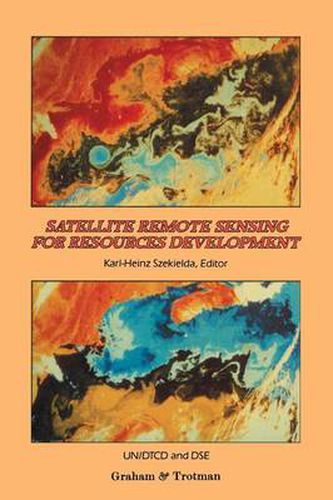Readings Newsletter
Become a Readings Member to make your shopping experience even easier.
Sign in or sign up for free!
You’re not far away from qualifying for FREE standard shipping within Australia
You’ve qualified for FREE standard shipping within Australia
The cart is loading…






This title is printed to order. This book may have been self-published. If so, we cannot guarantee the quality of the content. In the main most books will have gone through the editing process however some may not. We therefore suggest that you be aware of this before ordering this book. If in doubt check either the author or publisher’s details as we are unable to accept any returns unless they are faulty. Please contact us if you have any questions.
An Interregional Expert Meeting on the Use of Satellite Imaging RADAR and Thematic Mapping in Natural Resources Development, organized by the Economic and Social Develop ment Center of the German Foundation for International Development - DSE - in co-operation with the United Nations Department of Technical Co-operation for Develop ment - DTCD - was held in Berlin (West) from 21 November to 4 December 1984. As a result of this meeting, the participants made the following recommendations: A. REMOTE SENSING SYSTEMS AND AVAILABILITY OF DATA 1. Acquisition Platforms and their Continuity The participants expressed concern over the insecurity which clouds the future of orbital remote sensing platforms - the U. S. Landsat series should be continued, if at all possible. The planned initial ten-year operational lifetime of SPOT is en couraging and received support. ESA/ERS 1, Japanl J-ERS 1 and Canada’s RADARSAT programmes should be given full imple mentation commitment, as soon as possible, and plans should be developed for system continuity. The participants noted that development of national and regional remote sensing programmes in developing nations, and establishment and upgrading of appropriate ground receiving stations for these systems depends critically on the prospect of platform continuity. vii SATELLITE REMOTE SENSING FOR RESOURCES DEVELOPMENT 2. Future Developments (a) Future developments in microwave remote sensing from space should be encouraged so as to circumvent, among others, the problem of cloud cover and to facilitate extension of application areas.
$9.00 standard shipping within Australia
FREE standard shipping within Australia for orders over $100.00
Express & International shipping calculated at checkout
This title is printed to order. This book may have been self-published. If so, we cannot guarantee the quality of the content. In the main most books will have gone through the editing process however some may not. We therefore suggest that you be aware of this before ordering this book. If in doubt check either the author or publisher’s details as we are unable to accept any returns unless they are faulty. Please contact us if you have any questions.
An Interregional Expert Meeting on the Use of Satellite Imaging RADAR and Thematic Mapping in Natural Resources Development, organized by the Economic and Social Develop ment Center of the German Foundation for International Development - DSE - in co-operation with the United Nations Department of Technical Co-operation for Develop ment - DTCD - was held in Berlin (West) from 21 November to 4 December 1984. As a result of this meeting, the participants made the following recommendations: A. REMOTE SENSING SYSTEMS AND AVAILABILITY OF DATA 1. Acquisition Platforms and their Continuity The participants expressed concern over the insecurity which clouds the future of orbital remote sensing platforms - the U. S. Landsat series should be continued, if at all possible. The planned initial ten-year operational lifetime of SPOT is en couraging and received support. ESA/ERS 1, Japanl J-ERS 1 and Canada’s RADARSAT programmes should be given full imple mentation commitment, as soon as possible, and plans should be developed for system continuity. The participants noted that development of national and regional remote sensing programmes in developing nations, and establishment and upgrading of appropriate ground receiving stations for these systems depends critically on the prospect of platform continuity. vii SATELLITE REMOTE SENSING FOR RESOURCES DEVELOPMENT 2. Future Developments (a) Future developments in microwave remote sensing from space should be encouraged so as to circumvent, among others, the problem of cloud cover and to facilitate extension of application areas.